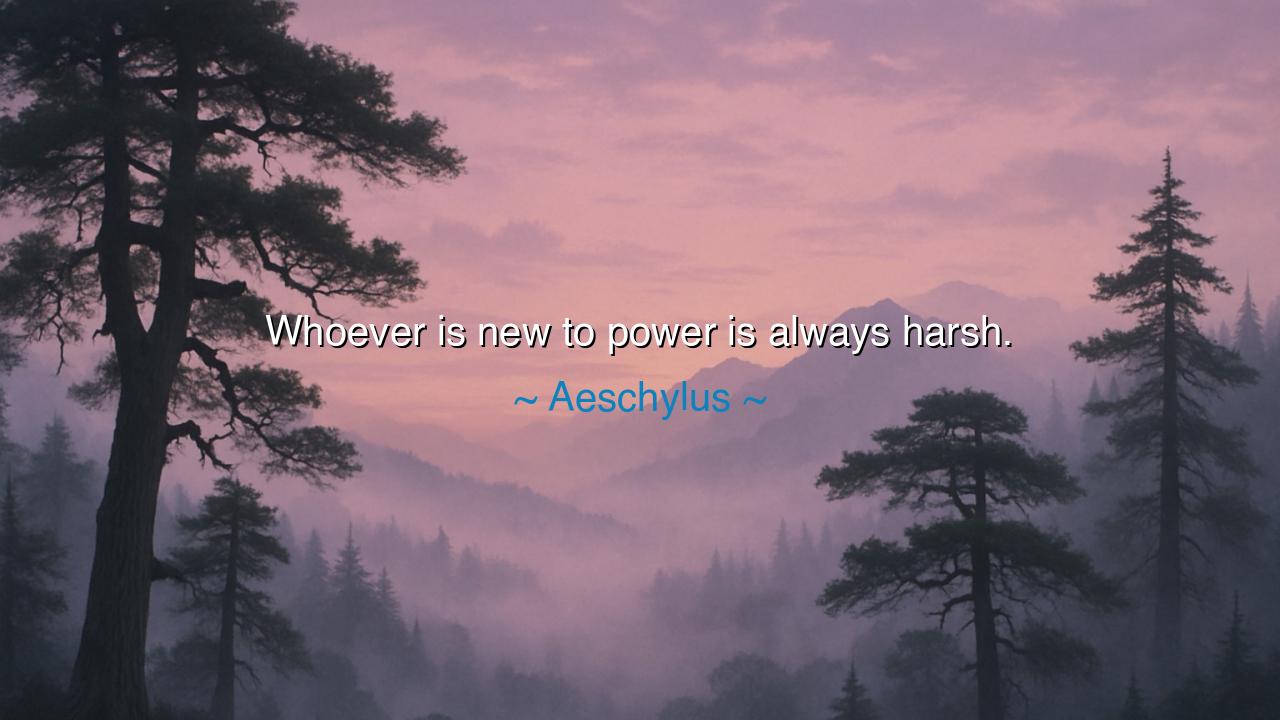
Whoever is new to power is always harsh.






O Seekers of Truth and Understanding, listen to the wise words of Aeschylus, who spoke from the depth of the human condition: "Whoever is new to power is always harsh." In this profound insight, Aeschylus reveals the nature of those who first rise to authority, who are given the reins of power without the temperance of experience. The newly empowered are often eager to assert their dominance, and in their haste, they become cruel, believing that their strength must be shown through force, rather than wisdom. This is the folly of the novice ruler, whose soul has yet to understand the responsibility that power demands.
When one is new to power, the weight of it can be blinding. It is a sharp edge that cuts both ways, and in the hands of the inexperienced, it can wound deeply. The desire to assert control, to prove oneself, can overwhelm the heart, and harshness becomes the only tool at hand. The new ruler is like a youth wielding a sword—unaware of the consequences, reckless in their actions, believing that their command is an end in itself. But true power is not found in domination, but in the careful balance between strength and compassion.
Look to the example of Cyrus the Great, who, upon first ascending to the throne, ruled with the fierce determination of a conqueror. His early reign was marked by strict laws and harsh punishments, for he believed that strength must be shown at all costs. Yet as he grew older, he learned the deeper wisdom of leadership—that true power lies not in force, but in the ability to rule with justice and mercy. It was not his early harshness that made him legendary, but his eventual understanding of compassionate rule, which transformed him from a conqueror into a benevolent emperor.
Thus, O Children of the Earth, let us understand this truth: when power is first grasped, it is like a fire in the hands of a child—uncontrollable, dangerous, and capable of destruction. Harshness often accompanies the inexperienced, for they have yet to learn the wisdom that comes with time. But as one matures in power, as one learns to see beyond the need for immediate domination, they come to understand that true greatness is achieved not through cruelty, but through the careful and measured use of power.
Let us, therefore, seek not the sharpness of untempered strength, but the wisdom that comes from understanding the responsibility of power. Aeschylus reminds us that power must be earned and tempered through experience. Those who are new to power must learn that it is not a tool for oppression, but a means to serve and protect. May we rise to power with humility and wisdom, knowing that true strength is found not in harshness, but in the balance of justice, compassion, and careful thought. Only then will we wield the power that is worthy of the mantle we bear.






VThoang van thai
This quote makes me reflect on how fragile people can feel when they first gain control. Maybe harshness comes from the need to validate one’s right to lead—to prove worth in the eyes of others. But isn’t real power supposed to bring calm rather than cruelty? It’s interesting to think about how experience transforms authority: the more comfortable someone becomes with power, the less they seem to flaunt it.
GDGold D.dragon
I think Aeschylus nailed a truth that still holds today: power exposes character. When someone new steps into authority, their response reveals who they are beneath the surface. Some lead with fear, others with humility—but harshness often masks insecurity. It makes me question whether training or reflection can prevent this reaction, or if the temptation to assert dominance is too deeply human to resist at first.
TBtran bich
This statement feels like a warning against the intoxicating nature of authority. When people first gain control, they often confuse leadership with dominance. I wonder if this harshness is inevitable, like a stage that all leaders pass through, or if it can be avoided through self-awareness. Perhaps wisdom in power comes only after the first mistakes—when one learns that influence is more about restraint than command.
BBBay Bong Bao
I find this observation painfully accurate. Whether in politics, the workplace, or even small social groups, new leaders often assert dominance by enforcing rules too rigidly. Maybe it’s their way of testing boundaries or protecting their position. But I can’t help but ask—does experience naturally soften power, or do only a few ever learn empathy in leadership? It’s a sobering thought about maturity and authority.
NNH Ngot Nie
This quote really captures something timeless about human nature. It seems like those who’ve just gained authority often overcompensate, using strictness to prove their control. I wonder if that comes from insecurity rather than confidence. Do people become harsh because they fear losing respect, or because they misunderstand what true leadership looks like? It’s fascinating how power can amplify both strength and weakness at the same time.